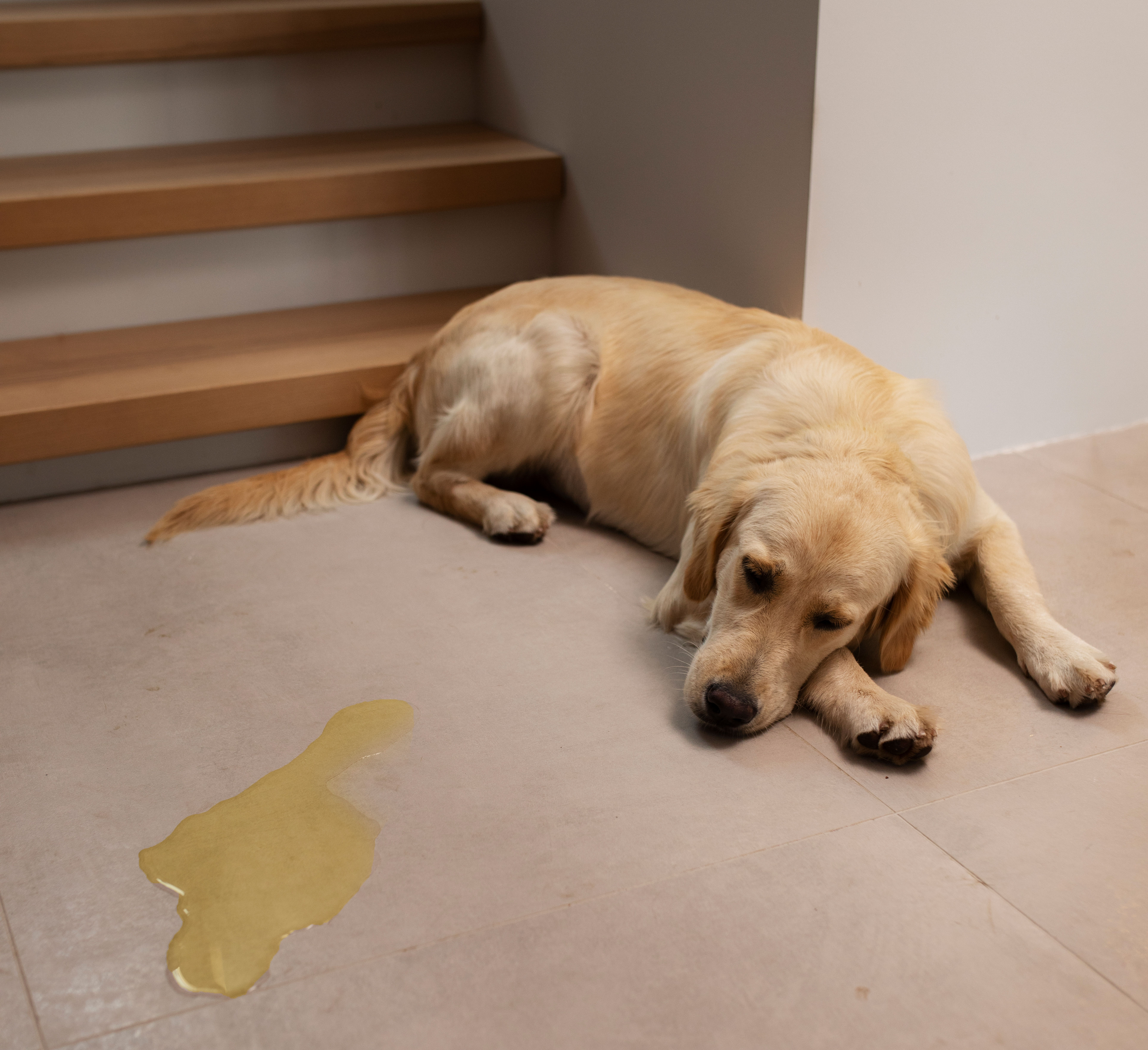
Understanding Why Your Dog is Throwing Up Yellow Bile: Tips and Solutions
Nothing sets an owner’s heart racing like hearing or seeing their dog vomit. It’s one sound that can set you racing from your bed in the middle of the night, even if you had been fast asleep! If you find a pool of yellow fluid rather than food or saliva, you may be wondering what is going on. Generally, bright yellow liquid will be bile.
- Yellow dog vomit often caused by dietary issues or mild infections.
- Continuous vomiting in dogs may signal a serious condition.
- Persistent dog vomiting may require veterinary tests and treatments.
- Dogs with blood in vomit or suspected toxicity should see a vet.
Bilious vomiting is not uncommon and most dogs will do it at some stage in their life. It is not a sign of any one specific disease and can have a range of causes. Let’s take a closer look at why dogs vomit bile and what can be done about it.
The information provided herein is for informational purposes only. Please refer to our disclaimer for more details..
- Should I be worried if my dog throws up yellow?
- What are the most common causes of vomiting yellow?
- How do I know if my dog throwing up is serious?
- What should I feed my dog after vomiting yellow bile?
- Are there any home remedies for when a dog is vomiting yellow?
- What if my dog has diarrhea and vomiting episodes?
- What are the treatment options if a dog is throwing up yellow vomit?
- When should I take my dog for veterinary treatment for vomiting?
Should I be worried if my dog throws up yellow?
If you have never seen your dog throwing up bile before, you would be forgiven for panicking, as it can look quite dramatic. Thankfully, the majority of the time, a dog throwing up yellow bile is not a reason to be overly concerned.
If your dog just vomits once or twice and is otherwise well, they may have just eaten something they should not have or picked up a mild infection. Most are back to normal within a day or two.
Of course, if your dog is persistently vomiting or has other symptoms, there may be something more serious going on.
What are the most common causes of vomiting yellow?
Your dog may vomit for a wide range of reasons, some of which are more serious than others. The most common causes of yellow vomit in dogs include:
- Dietary indiscretion (when a dog has ingested something they should not have)
- An abrupt diet change
- Bilious vomiting syndrome (these dogs often vomit first thing in the morning)
- Parasites
- Pancreatitis (inflammation of the pancreas)
- Liver disease
- Gall bladder disorders
- Food allergies
- IBD
- Addison’s disease
- An intestinal blockage
- Toxicity
Bile is a digestive juice that is yellow in color. While the color of the vomit can provide some clue as to what is going on, this isn’t always the case and any condition that can cause vomiting can cause bile vomiting.
What is true, is that vomiting on an empty stomach or vomiting so much that there is nothing left in the stomach, often results in there being bile present.
How do I know if my dog throwing up is serious?
Vomiting in dogs is not a specific sign and there can be lots of possible causes ranging from bilious vomiting syndrome or dietary indiscretion to pancreatitis or liver disease. We’d start to wonder if the cause of their vomiting is serious if the dog’s signs are not improving and they seem poorly e.g. lethargic, off their food, bloated or losing weight.
If your dog is throwing up all the time or in large amounts, this is something to pay attention to. When vomiting continues for longer than 24 hours or if they’re vomiting everything they eat or drink, alarm bells start to ring for me.
What should I feed my dog after vomiting yellow bile?
It is wise to stick to a bland diet if your dog has been getting sick, to help settle things. We generally fast the stomach for 6-12 hours, depending on the age of the pet. For very young or sick dogs, we may not fast them at all as it could lead to low blood sugar.
When we do offer food, we should do so in small portions, to see if it can be held down. If a dog is reluctant to eat, it can help to warm the food up and to offer it from our hand or a spoon.
Some good options include boiled chicken or turkey breast, sweet potato, rice or eggs. If available, we can also give a prescription gastrointestinal food like Hills i/d. We typically want to steer clear of store bought dog food and treats, at least until the vomiting has ceased.
Are there any home remedies for when a dog is vomiting yellow?
One simple thing to try is to rest the stomach for a number of hours, while offering small drinks of water. This can help to reduce inflammation within the gut and to prevent further vomits.
After this, as mentioned above, we should offer some highly digestible food.
It isn’t a bad idea to provide some probiotics too; to help improve the health of the gut microbiome if needed.
If the vomiting has been triggered by travel sickness, there are tablets available to combat this which can be prescribed by a veterinarian and these can be given before future journeys.
What if my dog has diarrhea and vomiting episodes?
We tend to worry a little more when a vomiting dog also has diarrhea, as this can lead to dehydration quicker and is a sign of a gastrointestinal tract that is not happy. Still, these two symptoms often go hand in hand and it is not necessarily something serious.
Oftentimes, the cause will be an infection or a dog who has raided the bins! The body may simply be trying to eliminate something it feels should not be inside.
For these dogs, if mildly dehydrated we may suggest the owner provides a rehydration solution and adds water to meals. More serious cases of dehydration might require that the dog is admitted to the clinic for IV fluids and anti nausea medicine.
What are the treatment options if a dog is throwing up yellow vomit?
From home, feed your dog a bland diet and keep them nice and hydrated.
We might also consider a short course of probiotics.
Do ensure your dog is up to date with their worm prevention. If not, their wormer can be given once the bout of vomitnig has stopped (we would not want them to throw up the worming medicine!).
However, if you think your dog is not improving quickly or you’re worried there could be more going on, you should seek the appropriate treatment from the vet. They can examine your pooch, and may run some tests such as a blood test and abdominal imaging, if concerned. Treatment options will depend on what is going on and may include e.g. IV fluids, anti nausea medicine, antacids and/or antibiotics.
When should I take my dog for veterinary treatment for vomiting?
If your dog is otherwise well and has only been vomiting for a short time (acute vomiting), they may not need to see their vet. Keep in mind that this will depend on your dog’s age and general health; a very young or very old dog is less able to cope when unwell.
Watch out for worrying signs that are occurring alongside the vomiting such as shaking, a tense or bloated abdomen (indicating abdominal pain), pale or dry gums, jaundice (yellow mucous membranes), lethargy or food refusal.
If there is blood in the vomit, your dog would need to be seen.
Always take your dog to the vet if you think your dog ate something toxic or has a gut obstruction.
44Kviews
Share on FacebookExplore more of these tags
I like dogs, but would not take any advice from a humours site. Sorry. And six post in a row on one day, at least spread them out with one a day please? 🎅🎄🤶
My cocker would occasionally vomit bile first thing in the morning. Our vet recommended feeding him in the evening just a handful of food. It worked for him and no more early morning vomiting. We fed him 1/2 cup four times a day, just small portions or he would vomit his food if we fed him 1 cup twice a day.
No. Just get out of here. We don't come to bp for this
I like dogs, but would not take any advice from a humours site. Sorry. And six post in a row on one day, at least spread them out with one a day please? 🎅🎄🤶
My cocker would occasionally vomit bile first thing in the morning. Our vet recommended feeding him in the evening just a handful of food. It worked for him and no more early morning vomiting. We fed him 1/2 cup four times a day, just small portions or he would vomit his food if we fed him 1 cup twice a day.
No. Just get out of here. We don't come to bp for this

 Dark Mode
Dark Mode 

 No fees, cancel anytime
No fees, cancel anytime 






 Image credits:
Image credits:  Image credits:
Image credits: 










































1
3